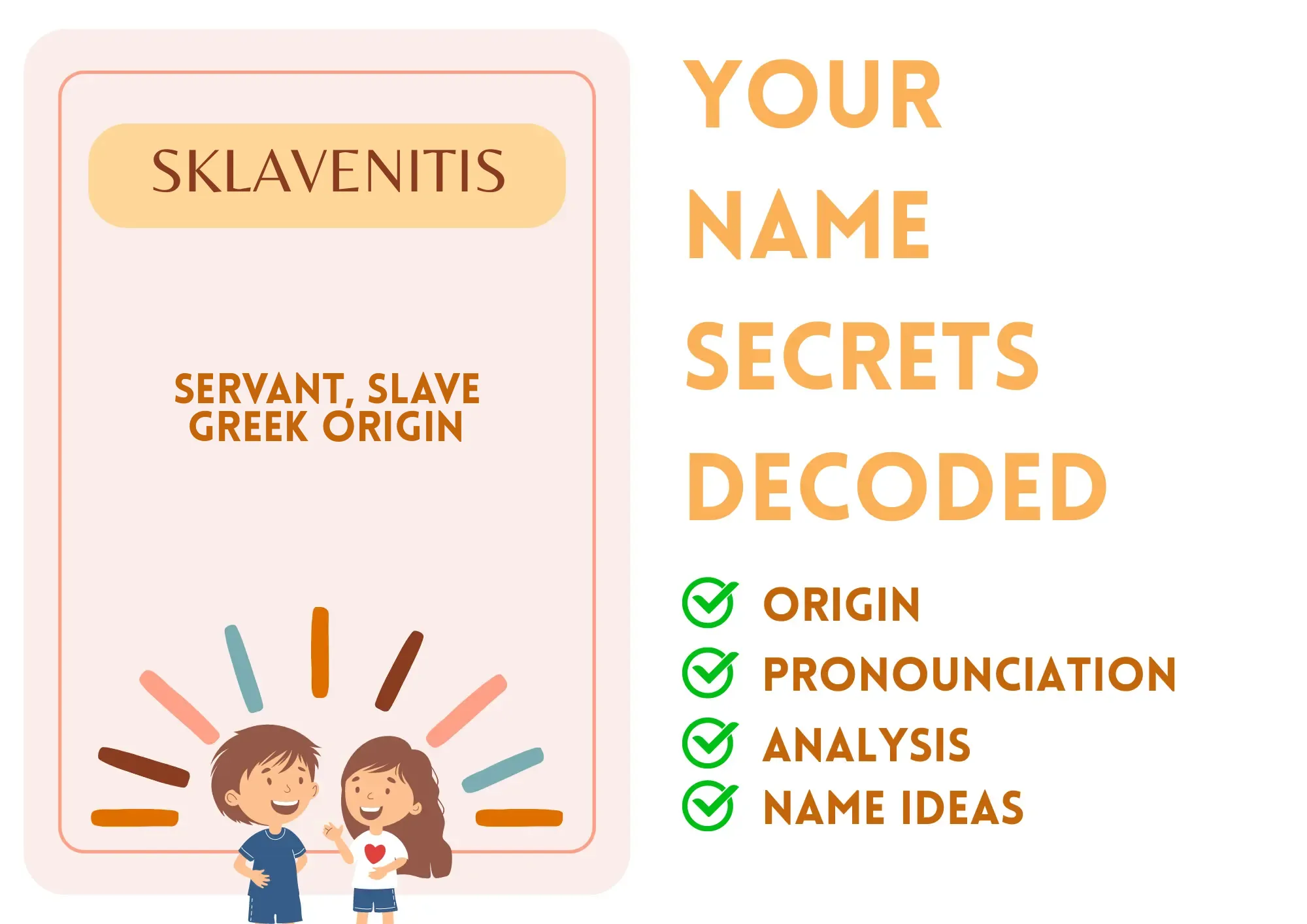
Sklavenitis
Sklavenitis is a rather unique name with Greek roots. It translates loosely to 'slave' or 'servant' (from the Greek word 'sklavos'). Historically, the name has been used to describe individuals originating from specific socio-economic classes within Greek culture.
The name Sklavenitis carries a historical weight, possibly reflecting the lineage or heritage of descendants from enslaved individuals, highlighting both struggles and resilience. It is not a commonly used name in contemporary settings, giving it an air of exclusivity and distinctiveness.
People perceive this name with a mixture of curiosity and respect due to its rarity. However, its meaning could evoke complex feelings as societal context alters its reception. The ease of writing and calling is moderate due to its length and unusual structure, although it is phonetically simple.
Basic Information
Gender: Unisex
Sounds Like: sklah-veh-NEE-tis
Pronunciation Explanation: Emphasis is placed on the third syllable 'NEE', with a clear and fluid connection between the syllables.
Summary and Meaning
Meaning: servant, slave (Greek origin)
Origin: Greek, linked to terms indicating servitude or ancestry of enslaved people.
Usage: Though traditionally used, the gender association is not strict, allowing for unisex usage.
Name Number (Chaldean)
Name Number (Pythagorean)
Popularity (Global Rank)
Overall: 1327923
Boys:
Girls: 77177
Most Popular in
Religious and Cultural Significance
Religion: Greek Orthodox
Background: In Greek culture, names often have roots in historical contexts, and although Sklavenitis may not have overt religious connotations, the Greek Orthodox Church has influenced many Greek names.
Cultural Significance: This name reflects historical socio-economic structures and may relate to discussions of heritage among Greek communities.
Historical Significance: Sklavenitis serves as a reminder of social hierarchies in ancient Greece. Names derived from occupations or statuses in society have historical importance in understanding certain cultural legacies.
Popular Culture
Literature and Mythology: While Sklavenitis specifically does not appear prominently in popular literature, names of Greek origin often echo through various works relating to ancient Greek life and struggles.
Movies and Television: Characters sharing similar attributes may appear in narratives discussing ancient Greek themes; however, Sklavenitis as a direct name may not be represented.
Feelings and Perceptions
Perception: Sklavenitis can evoke curiosity due to its rarity and unique sound, but also contemplation regarding its meaning and origins.
Positive Feelings: Unique, historical, intriguing, culturally rich.
Negative Feelings: Potential discomfort due to associations with servitude or slavery.
Practical Considerations
Ease of Writing and Calling: Sklavenitis is relatively easy to pronounce if the phonetics are followed, but it may be challenging for those unfamiliar with Greek phonetics. Its length may make it less convenient as a casual name.
Common Typos and Misspellings: Sklavonitis,Sclavenitis,Sklavinitis,Sklavetis
Common Nicknames: Skla,Niti,Veni
Sklavenitis Popularity
Sklavenitis Usage and Popularity By Country
| Country | Rank (Overall) |
|---|---|
| Greece | 18504 |
| United States | 539518 |
Sklavenitis Usage and Popularity By City
| City | Rank (Overall) |
|---|
Compatibility Analysis
Famous Persons Named Sklavenitis
No results found for Sklavenitis.
Related Names
Similar Sounding Names:
Klavin,Slaven,Lavin

